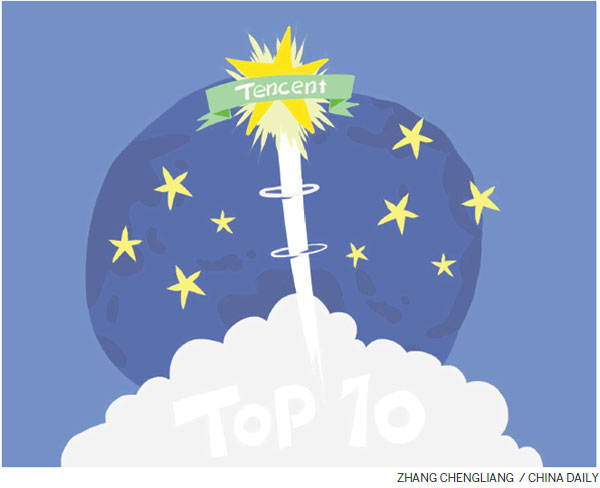Tencent is now among top 10 brands
But as Chinese companies go global, valuation methods may be overlooking role of emotional attachments among consumers
Tencent, one of an increasing number of Chinese internet giants, has just smashed into the world's top 10 most valuable brands.
The company, ranked as the eighth most valuable global brand by the recently released Millward Brown's BrandZ 2017, improved on last year's ranking (11th), which appears mainly due to increased use of its social platform WeChat.

BrandZ 2017 is one of the most respected global brand valuation rankings, with an impressive methodology that involves data collection from tens of thousands of consumers in more than 200 countries. It reports an impressive brand value increase for Tencent of 27 percent, and it values the Shenzhen-based company at $108.3 billion (97 billion euros; £85 billion). Tencent has become the first non-US-owned brand to surpass the $100 billion mark.
Of the top 10 most valuable global brands, Tencent's year-on-year percentage increase is only surpassed by Amazon, ranked fourth.
Tencent's meteoric rise is all the more remarkable given the intense competition in the technology sector. BrandZ 2017 continues to highlight the dominance of technology-related companies and their brands.
In fact, the technology sector alone now contributes more than half of the ranking's overall brand value, where the combined value of the world's top 100 most valuable brands stands at a staggering $3.64 trillion.
Nine of the top 10 brands in the BrandZ 2017 ranking are technology-related, for example Google and Microsoft, and all of the seven newcomers are as well: XFinity, You-Tube, Hewlett Packard Enterprise, Salesforce, Netflix, Snapchat and Sprint.
But Tencent's continued global rise should not be seen as an isolated success story. In fact, at a regional level, brands from China posted an increase in value of 11 percent, excluding State-owned enterprises. Only the US also saw an increase, up year-on-year by 12 percent, and brands from the rest of the world declined in value by 1 percent.
A total of 13 Chinese brands have been placed in the BrandZ most valuable global brand ranking this year. In addition to Tencent's top 10 position, other Chinese brands that appear are Alibaba (14th), China Mobile (17th), Industrial and Commercial Bank (28th), Baidu (39th), Huawei (49th), Ping An (61st), Sinopec (85th), China Life (78th), China Construction Bank (54th), Agricultural Bank of China (72nd), Bank of China (94th) and Moutai (64th).
BrandZ is not the only ranking that highlights the growing influence and value of Chinese brands. The Brand Finance Global 500 list, published earlier this year, ranked a total of 16 Chinese companies in their top 100 most valuable global brands. In addition, research published in March by London-based Brand Finance concluded that Chinese brand Kweichow Moutai, maker of baijiu, has overtaken Johnnie Walker brand owner Diageo to become the world's most valuable liquor-company. Baijiu is also not a lone star among Chinese drinks brands, however. BrandZ 2017 reported a mesmeric 48 percent increase in brand value for Moutai, which climbed to 64th in this year's rankings with a financial valuation of $17 billion. Moutai now sits proudly on top of all other spirits brands across the globe.

But in spite of the good news for Chinese brands generally, it is Tencent and its WeChat messaging app that have stolen the show this year. WeChat is one of the most advanced messaging apps in the world, together with fellow Asian rival Line. This is mainly due to its greater range of services, from messaging to payment services.
Launched in 2011, WeChat now has an incredible base of 900 million-plus regular users. It is, therefore, critical that European brands make full use of WeChat with an extremely polished presence.
European companies should also be aware of Tencent's European expansion plans for its WeChat app. WeChat intends to expand into Europe and support European brands in their Chinese market penetration. The UK appears to be the steppingstone, with France and Germany targeted soon after.
But Tencent's remarkable rise does not come solely down to its innovative messaging and payment service app.
The skillful strategic management of Pony Ma, Tencent's leader and founder, cannot be underestimated. Shrewd takeovers present unequivocal evidence of Ma's far-sighted, focused management of the company. He continues to personally oversee the entire business planning process and steers the company with a very clear direction.
Ma is perhaps symbolic of a new, erudite Chinese business leader. Widely regarded as possessing excellent interpersonal skills, he continues to work comfortably with the European business community and has attracted considerable investment from outside China.
Unlike Alibaba and Jack Ma, Tencent under Ma's stewardship has focused on the technology sector and acquired a number of small, innovative companies in accordance with this very focused direction.
Now, some may point out that many of these Chinese brands that have found their way into the world's most valuable 100 - Tencent very much included - depend mostly on the Chinese mainland market. While this is the case, it does not detract at all from their stupendous success. It also means that they are very well placed to form tie-ups with European companies eager to build their brands across the Chinese mainland.
It is also the case that Tencent and many other Chinese brands are set on major international expansion, which will drive their brand building from now on.
But the most important point about Tencent and other Chinese brands' dominance across the Chinese mainland is that it probably means BrandZ and other financial valuation methodologies have actually underestimated their brand value. There are two reasons behind this assumption. First, brands often have a far greater emotional meaning where Chinese consumers are concerned, and second, there is patriotic attachment to the native brands.
My ongoing research on Chinese consumer behavior consistently finds that Chinese consumers often see deeper emotional meaning in the brands they consume. Social media are a perfect example of a far more personal, emotional experience found among Chinese consumers, compared with Westerners. The motivation behind brand consumption for Chinese consumers still has a lot to do with status and power.
But it appears that BrandZ and other financial valuation methodologies do not consider cultural influences directly or the brand value implications.
Emotional, rather than rational, meaning often leads to a richer, more valued and far more personal, even intimate, brand consumption experience. It then follows logically that brands-and this is so often the case where Chinese consumers are concerned - from which the consumer interprets and experiences greater emotional benefits should be attributed ever higher intangible brand value. Consequentially, higher financial value should follow.
As Chinese consumers venture overseas more and more, often spending significantly on an increasing variety of branded products and services, financial brand valuation methodologies such as BrandZ and Brand Finance might calculate increasingly inaccurate financial figures.
Cultural influence has to be factored into any financial valuation. British luxury brand Burberry exemplifies this point perfectly. Burberry has a huge Chinese following, but the typical Chinese Burberry consumer assigns a very different, far more emotional meaning to this brand compared with a typical British consumer. It is, therefore, reasonable to assume that any financial valuation of the Burberry brand will be higher with higher numbers of Chinese consumers.
Another important, and apparently neglected, feature of brand consumption where Chinese consumers are concerned is the patriotic effect. Even younger Chinese consumers continue to exhibit very strong patriotic feelings. Consumption of Chinese brands, therefore, is likely to lead to even higher intangible and financial value associated with this experience, if consumed by Chinese citizens.
All in all, Tencent and other leading Chinese brands deserve tremendous credit for their rise up the global brand rankings, and European expansion and penetration are now at the top of their strategic plans.
The author is a visiting professor at the University of International Business and Economics in Beijing and a senior lecturer at Southampton University. The views do not necessarily reflect those of China Daily.
























